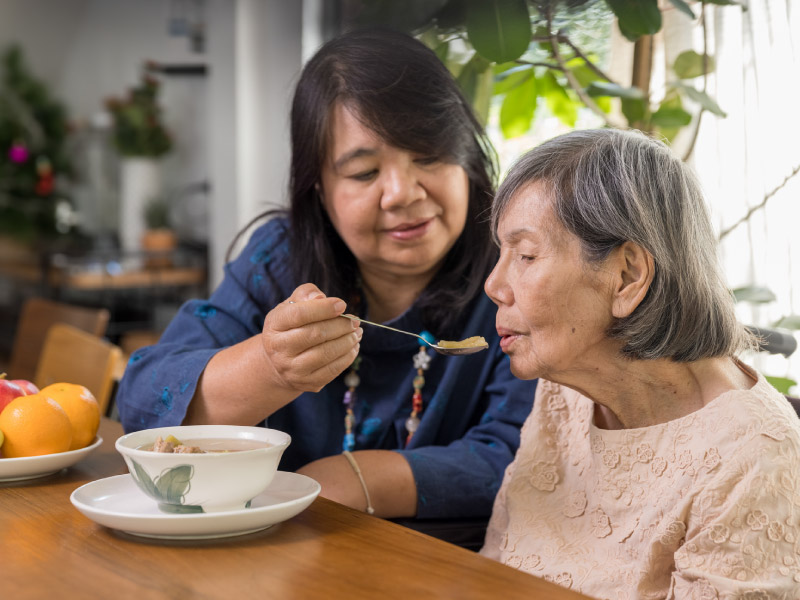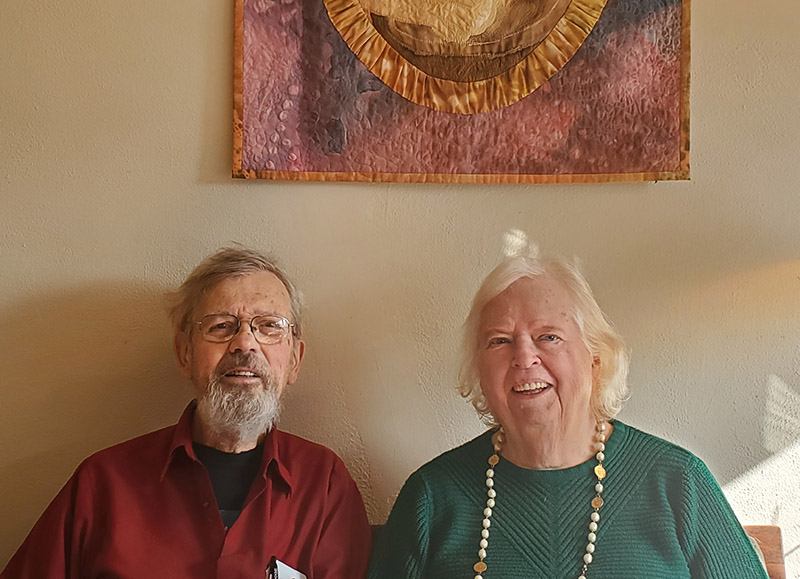The risks and rewards of caregiving for loved ones with dementia
By Laura Williamson, American Heart Association News

Every night before bed, Pat and John Sullivan list at least three things for which they are grateful that day. Their 40 years together, each better than the last. The joy they get from art and music. Their ability to keep loving and supporting each other through all the challenges they face.
"John started the practice, but he doesn't remember doing it," said Sullivan, whose husband was diagnosed two years ago with Lewy body dementia, a common type of dementia that can interfere with thinking, balance, behavior and mood.
Practicing gratitude is something John can still do. There are many things he can't: hold a job; walk down steps without assistance; pay the bills; launch a Zoom call; or remember the name of the disease that's slowly robbing him of independence. Sullivan, who is 79, does these things for him while juggling work, running their household and managing her own chronic illness – Type 2 diabetes.
"The hardest thing is not having a break," she said. "And looking at him and knowing he's not going to come out of this alive."
Sullivan is one of more than 16 million people in the U.S. who provide care for loved ones with dementia. The vast majority of people with dementia – about 80% – receive care at home, often from family members or friends whose work is unpaid, according to the Centers for Disease Control and Prevention. Two-thirds of these caregivers are women; 1 in 3 are 65 or older.
As the population ages, the need will continue to grow. But caring for loved ones can take a toll, especially if the caregiver also has health issues.
About 40% of caregivers have two or more chronic illnesses, and around 35% age 65 and older have a disability, according to the CDC. Providing care to others makes it harder for them to take good care of themselves. It also places them at higher risk for a range of mental disorders and other health issues, including anxiety, depression and cognitive decline.
Even so, the Sullivans' gratitude list grows nightly. Sullivan believes that practice along with mindfulness and other types of self-care are crucial. "When I feel burdened, which happens at least twice a day," she said, "I stop and say, 'What am I not facing, and how am I not caring for myself?' The truth is, this is hard. It's very hard."

How much stress a caregiver feels is a greater indication of how much the job will affect their health than the amount of caregiving they provide, said David Roth, director of the Center on Aging and Health at Johns Hopkins University School of Medicine in Baltimore. His research found caregivers who reported a lot of strain didn't live as long as those who better managed the stress.
Caregiving involves a range of tasks, such as managing a person's money, medications and personal care, including bathing, feeding and toileting. Roth said he asks people in his studies to describe the help they provide as well as how much strain it causes them. "We get a wide range of responses. For some people, helping with toileting, for example, is very stressful. For others, it is not."
Caring for people with dementia can be more stressful than other types of care, experts say. One reason it may be harder on families is that people with dementia often need care longer than people with other age-related conditions. According to the CDC, more than half of dementia caregivers provide care for four years or more.
"The main people who are at risk of physical health problems are those who feel overwhelmed by their responsibilities and have been doing it many months or even years, so it has a wear and tear effect on their systems," Roth said. "They feel like they have little control or choice and can't get additional resources to help them carry the load."
Sullivan said she gets help from neighbors, friends and community organizations, but it's no longer enough. Soon, she and her husband will move from their apartment in Oakland, California, to her childhood home in Shenandoah, Virginia, where they will live with her sister. Having support from extended family and a larger, more suitable living environment where everything is on one floor "will be huge," she said.
Families should start having conversations early on about what long-term care will look like for their loved ones, including who will provide that care and who will provide support to the primary caregiver, said Christina Irving, client services director for the Family Caregiver Alliance in San Francisco.
"The earlier people get help and support the better," she said. "Caregiving can take a toll and caregivers are not always able to step back and see that they need help. Don't wait until the caregiver is burned out or overwhelmed."
Irving also advises families put legal documents in place long before they are needed. These may include advance care directives in case the person is unable to make medical decisions on their own or power of attorney in case they are no longer able to pay their own bills or make financial decisions. "Individual circumstances will differ, but make sure there is somebody there to manage your affairs if you are no longer able to manage them for yourself," she said.
Roth said one caregiver shouldn't be expected to do it all. Family members, neighbors, churches and other community resources such as adult day care providers can all be tapped for support. "Partly as respite, but also as a second set of ears to contribute a positive voice and contribute new ideas to make the caregiving experience more peaceful and meaningful."
Because while the work of providing care to someone can be challenging, the experience doesn't have to be negative, he said.
"For older, retired people, sometimes it gives them a sense of purpose, like being a volunteer in their own family," Roth said. For an adult child, it may feel like an opportunity to "give back care and affection to a parent who has cared for you your whole life. It helps people feel like they are contributing in a positive way to the care of someone they love."
Sullivan finds the job both stressful and rewarding.
"You're still there with each other," she said. "Always. The big difference is whether you go into it consciously and intentionally," which she has. She discusses the situation openly with John, who is aware of his condition, even if he can't remember what it's called or how long he's had it. Together, they find ways for him to contribute as much as possible to his own care.
"It's less about providing care – it's about being engaged in a very rewarding partnership with this person I love."
If you have questions or comments about this story, please email [email protected].





